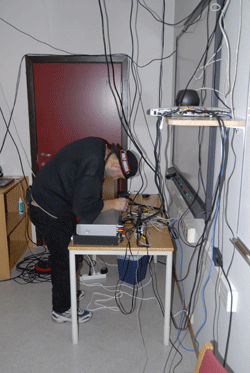5. Signing Contracts with Internet Service Providers and Contractors
When designing and building videoconferencing facilities, some things may always go wrong. Delays, hidden costs and overblown budgets are often experienced due to a variety of reasons. In other words; technical challenges and real problems should always be expected.
Because of this, it's vitally important that you reach an unambiguous agreement with the involved parties - your Internet service provider (ISP) and your contractor (who will be designing and building the infrastructure for the videoconferencing facilities) - about who is responsible for what. Who is responsible if the different parts of your visual communication system don't communicate properly with each other? The systems often consist of different boxes from different producers, which may function properly alone. However, in a diverse system the integrated solution may not function at all or at a too low and unacceptable output. Who is responsible if the project is delayed? And so on.
You should also expect that when something goes wrong, all the involved parties will do everything in their power to deny any responsibility on their part. It's therefore critical to have a thoroughly laid out contract which clearly states who is in charge of the various operations - the ISP, the contractor or a third party.
Every project has some element of risk in it, and the most common stumbling blocks are:
- Delays in implementation and coordination of the system as a whole
- Increased costs due to troubleshooting, use of internal resources, disagreements on who is in charge etc.
- Hidden costs related to administration of MCUs, gateways and gatekeepers. Software upgrades are not necessarily included in the service and support agreements you just signed.
Your agreement with the ISP should contain details about Quality of Service (QoS), i.e. if the ISP has agreed to dedicate bandwidth to your videoconferencing facilities. The contract should also clearly put the responsibility for network latency and uptime, as well as network security, at the hands of the ISP.
The contract should also state which actions should be taken if the delivery (i.e. the infrastructure) doesn't function properly, or if there are delays.
Documentation
The need for service and maintenance is inevitable for all videoconferencing facilities, and such tasks are greatly simplified (and less resource-hungry) if the documentation on the facilities is good.
The documentation and various user guides should be in your own language, and it should be available both on paper and CD (or some other electronic medium). Be sure to have several copies of the documents on every location - papers as well as CDs have an annoying habit of getting lost.

The interface for the control panel (a device to control and use all the videoconferencing facili-ties in a room) should be designed in cooperation with local superusers and the costs for at least 1 re-programming should be taken into account (in our experience, the initial programming of the user interface is never optimal). This re-programming should be done with the superusers present.
All cables and wires must be marked in accordance with relevant standards to make maintenance, troubleshooting and future modification of the systems as easy as possible. Circuit dia-grams are an absolute requirement.
|

